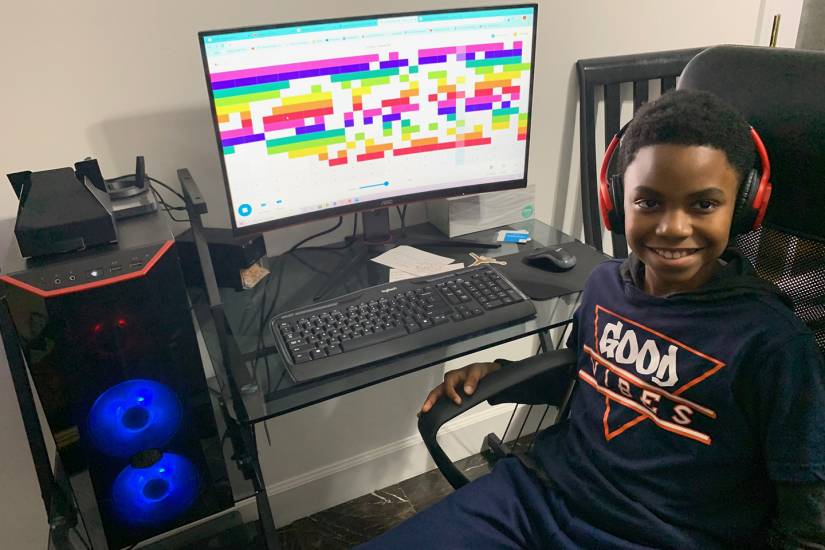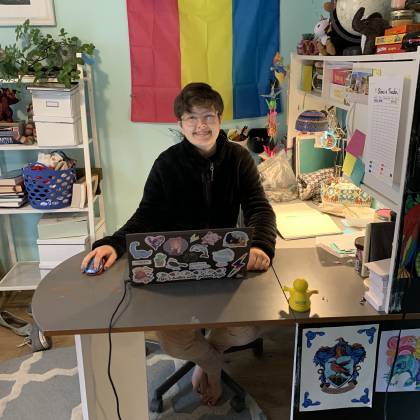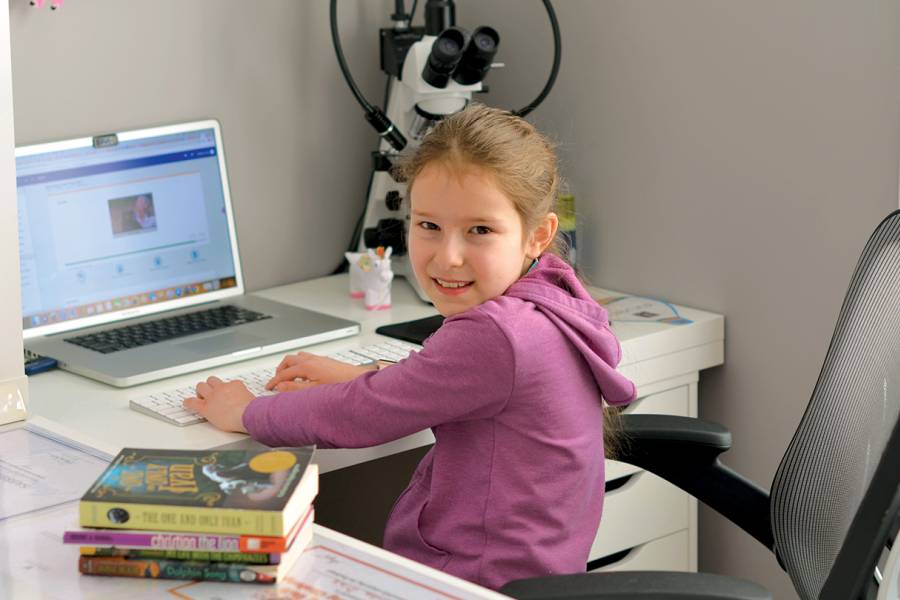While school systems around the world scrambled to meet the demand for virtual learning in the wake of the coronavirus pandemic, the Johns Hopkins Center for Talented Youth was preparing to provide the same broad range of challenging and engaging programming it has offered bright students year-round for decades—and meet its busiest season on record.
Thousands of students logged on to learn with CTY this summer—reading superhero stories, classifying stars, writing code, modeling infectious diseases, and more with their peers from around the world. Demand for CTY online courses spiked after many school systems were forced to end in-person instruction. Between May 1 and Aug. 1, CTY saw 12,280 active enrollments—a 111% increase over the same three-month period in 2019.
"The pandemic brought parents directly in view of whether or not their child was being adequately challenged in school," said Robert Arena, senior director of CTY Online Programs. "Some students would be done with all of their school-assigned work by noon, so parents quickly came to CTY for something additional—whether it was with a math course to help their child get ahead for next year, or a reading class that could provide more structured exploration of books they were already interested in reading."

Image caption: Christian Simmons, 11, from Douglasville, Georgia, has taken several summer and Online Programs courses with CTY, including “Inventions in Engineering” and “Building Blocks,” a grammar course.
Image credit: Courtesy of the Center for Talented Youth
The center is no stranger to online instruction. Its online programs have been among CTY's core offerings since its first web-based courses debuted in 2002, and the center currently hosts more than 200 instructor-led online courses that are offered year-round. But to meet this new demand, CTY staff worked tirelessly through the spring and summer to find innovative ways to reach and engage learners.
Chief among their goals was finding a way to adapt qualifying tests for virtual environments. Students qualify for CTY's academically advanced courses through testing, but just as interest in online courses spiked, testing centers around the world were closed, creating a backlog of students who wanted to enroll but had no way to qualify. CTY developed an online version of its School and College Ability Test that students could take at home. More than 5,600 students have taken the test since it launched in April.
Meanwhile, when CTY announced earlier this spring that all of its in-person summer programs would be canceled due to COVID-19, staff also started designing a new online alternative to help bright students continue learning in dynamic, web-based classrooms. CTY staff and seasonal instructors submitted 350 course proposals total, which were then narrowed down to about 50 and included Amusement Park Physics, Bioethics in the Age of Pandemics, Fantasy Worldbuilding, Mathematics of Pixar, and The Politics of True Crime. The courses were offered in two sessions this summer through the brand-new CTY Live Interactive Virtual Explorations, or L.I.V.E. program. Within days of its launch, more than 2,300 students had enrolled.

Image caption: From her home in Fresno, California, 15-year-old Sofia Kalmbach learned about writing computer code through CTY's L.I.V.E. program
Image credit: Courtesy of the Center for Talented Youth
L.I.V.E. participants included Sofia Kalmbach, 15, from Fresno, California, who learned to build and code through the program's Arduino Prototyping course.
"It was super fun interacting with the other students," Kalmbach said. "My instructor was really good at giving us feedback and helping us troubleshoot our projects. It was thrilling sending the code to the Arduino and everything running smoothly causing lights to turn on, buzzers to go off, and more."
CTY also kept more than 200 Baltimore elementary school students engaged this summer through an online version of its CTY Baltimore Emerging Scholars Summer Program, a partnership with Baltimore City Public Schools. Made possible through a grant from the Maryland State Department of Education, the program debuted onsite at two Baltimore City Public Schools last year. When it became clear that an in-person program would be impossible this year, staff knew it was critical to move the program online.
"On average, students lose 25 to 30% of the academic gains they made over the school year, and this 'summer slide' is even more pronounced for students from under-resourced areas," said program co-director Ashley Flynn. "Our program works to counteract this, while introducing students to new and exciting fields and honing their critical-thinking and spatial skills. So, although we were disappointed that the program could not happen in-person this summer, we were glad we could take the magic online."
Emerging Scholars staff developed virtual instructor-training sessions, class lessons, activities, and field trips and worked with the district to ensure all students had laptops or other tech devices and internet access. Their efforts paid off: The program was recently hailed in the Baltimore Sun as a model for online learning.
Looking ahead to an academic year that has many students again attending school virtually, enrollments in CTY's online courses are predicted to reach 12,000 or more this fall.
"As schools continue to struggle with converting their programs into online models, some of the differentiation that occurs in the classroom may prove difficult for them to execute online," Arena said. "As the result, advanced students in particular are going to see less challenge than they need in order for them to stay engaged and fulfill their potential, and so we're expecting more families to seek us out, and we will be ready to serve them. It's the proof point of why we exist."










